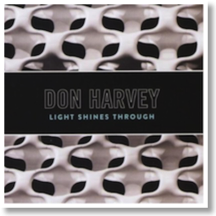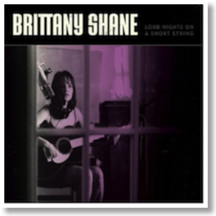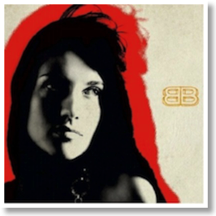May 2012
Light Shines Through

Light Shines Through
Freedom Records
Don Harvey has had a long music career filled with many collaborations and performances. The Austin-based drummer has lived in both New York and Tel Aviv and combines sounds from his experiences around the United States and the Middle East. Light Shines Through highlights his beautiful composition skills, and the many styles and genres he has performed and been exposed to, including classical, jazz, Middle Eastern, blues, and rock, profoundly influence this work. Because of this, the album is extremely unique and enjoyable.
The orchestration of the all-instrumental album includes drums, piano, trumpet, bass, guitar, and cello, among others. Trumpet solos and piano comping give the album a distinct jazz sound, but the drums and other compositional aspects of the music suggest ideas from many other genres. “Yasmin” includes many Middle Eastern harmonic and melodic ideas that are blended with the Western sounds of jazz and rock. The consistency of Harvey’s drumming ties together the song and the album as a whole. “Whirl” is more of a rock song than many on the album and includes an extended and bluesy electric guitar solo. The following track, “Light Shines Through,” begins with solo cello and builds to a larger instrumentation, showing off Harvey’s classical background; it has many elements of psychedelic rock towards the end, but it still keeps the original classical motif. The last song is a long culmination of the sounds introduced throughout the album, performed with a large orchestration, and experiments with many interesting sounds including bowed vibraphone and an electric organ.
This instrumental work is filled with interesting ideas and beautifully combines wonderful elements of many genres. The songs are long, giving the songs time to fully develop and the melodies room to grow. Don Harvey has performed with artists such as Ian McLagan, Charlie Sexton, and Billy Bragg, and his compositions allow us to see the styles of these artists shifted and changed into something interesting and creative.
by Hunter Tolbert
Loud Nights On a Short String

Loud Nights On a Short String
Painted Lady Records
Guitarist, songwriter, and singer Brittany Shane’s latest full-length Loud Nights On a Short String, has inflections of Sheryl Crow, and The Bangles, and The Sundays which enhance the summer ambience of this album. The love poem introduction “Paper And Pen” unearths a light groove and serves as a marker of what will follow, evidenced by the folk-tinted “Summer Calling” and the acoustic aura of the yearning “Come Around,” which could be interpreted as a call for optimism.
As the plot develops, the music becomes more aggressive. “A Sign From Me To You” pulsates, and “Keep It Down/You Are Loved” welds frequent instrumental effects with tempo changes. The pensive “Hazy Rose,” with a bass-percussion interplay that contributes a sound resembling maracas and the crack of a horsewhip, has a dreamy air recalling the Cranberries but with psychedelic nuances: “Hazy rose in my head/Now drifting above my dreamy bed…Why don’t you float my way instead?”
Washed in rock, folk, and pop colors, Loud Nights On a Short String balances summer warmth and vigor with reflection and loneliness without becoming too lost in the swirl of heartbreak and uncertainty. The album also effectively demonstrates the ups and downs of relationships through the use of nature, and its underlying theme of going forward, of being OK to make mistakes and hope for the better, suits the album’s title. “It’s how you handle the situation that makes you strong,” Shane says. “Are you going to stop when things get tough, or are you going to power through…and make something cool out of it?”
by Jeff Boyce
Butterfly Boucher

Butterfly Boucher
Self release
This upbeat work is the third album released by Australian singer-songwriter Butterfly Boucher. It exemplifies a perfectly danceable and fun indie rock album with driving rhythms and exact and groovy articulations. The harmonic structure of the album is generally consonant and catchy, and the quickly moving chords and ostinatos help to keep the vigorous pace of each song. Each moment of the album voices some sort of moving line, and each instrument shines at different points as they take turns having a leading line and adding to the interest of the track as a whole. This trading off creates a sense of unexpectedness and makes each moment more interesting as a new sound takes the focus and displays a variation on the themes of the tracks. It also creates a sense of fullness, further illuminated by the wide variety of instruments utilized in the album. In addition to guitar, drums, and bass, the standard for albums of this genre, Boucher adds interesting keyboard sounds, orchestral strings, background vocals, Latin American percussive instruments, a tambourine, and claps. Each instrument is utilized in many different ways; for example, the keyboard is often used to create a chordal undertone for the songs, but it often plays a more intricate melodic line, adding a splash of color. The various percussion instruments create a stronger sense of the danceable nature of each song. Some tracks, such as “Warning Bell,” provide a calmer break and serve as a foil for the rest of the rambunctious tracks.
Although the harmonies and rhythms of Butterfly Boucher seem light-hearted, the lyrics of this work are full of longing and somber anecdotes. She sings, “I miss that face; / I miss that mouth. / You loved me all along. / I know it now, / The place where I belonged.” Her stanzas each serve to vent her frustration of a lost love and validate her yearning; she finds creative ways in which to assert this universal feeling. Even
though
the music may at first seem to juxtapose with the subject of her lyrics, the two complement each other well and appropriately combine the very human aggregate of longing and happiness. Her voice is precise and clear, without soul or power, but what her vocals lack, she makes up for in vocal harmonies and instrumental melodies. In “Don’t Look Now,” Boucher sings of the pain she experiences and the shame that she feels. This song beautifully combines the sophisticated instrumentation and subtle melodic lines with vulnerable lyrics that make the album impressive. Her combination of these two aspects also allows her to create long songs and fully develop her ideas without overdrawing any of her motifs. Butterfly Boucher is an interesting and smart album; at first it seems fun and light-hearted, but the subtlety and emotion in each song jump out more and more with each listen. Her strength certainly lies in orchestration, both lyrically and musically, and this album is a wonderful testament to that.
by Hunter Tolbert


